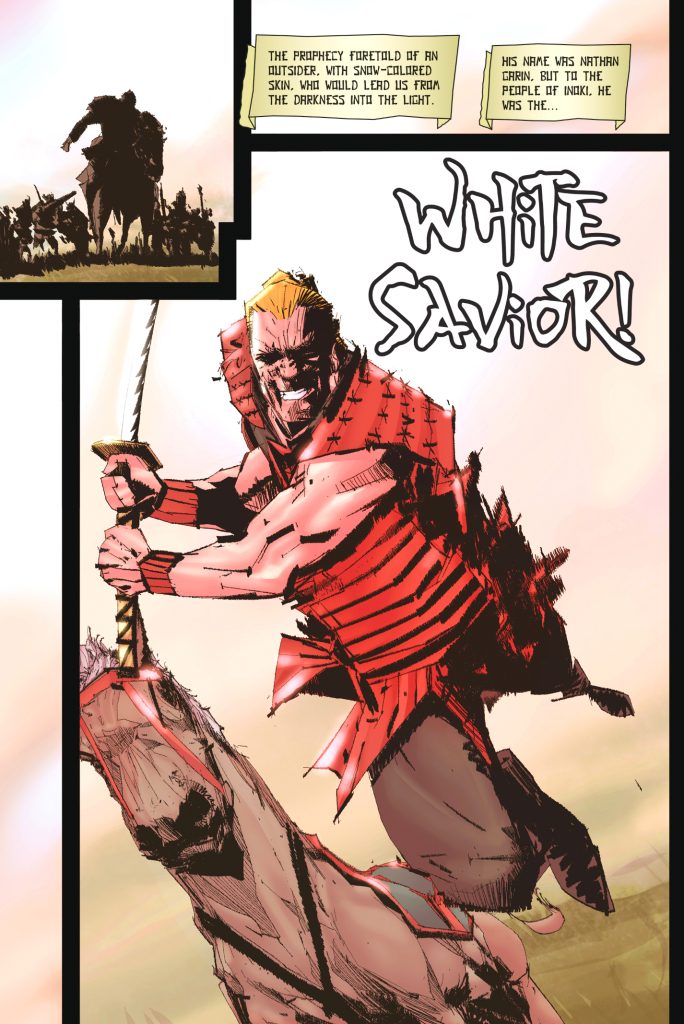Comic book artist Eric Nguyen has had enough of the Nathan Algrens and William Garins of the world. You know, the white guys who enter an Asian country and are seen as the only chance for salvation? From “The Last Samurai” to “Outcast,” these stories are a dime a dozen in Hollywood, focusing on a white hero while forgoing any agency that might be exercised by people of color.
Nguyen, who has worked on series like “Old Man Logan,” “Quicksilver,” and “Batman,” joined co-author Scott Burman to combat this trope by creating “White Savior.” The satirical limited series follows average guy Todd Parker, a Japanese American film professor thrust into feudal Japan. Now, he must warn the villagers of Inoki that their white “hero” is a bumbling fool who will only cause more bloodshed and death.
Ahead of the series’ first issue release on Jan. 18, Nguyen sat down with us at Character Media to give a behind-the-scenes look at the creation of the series and how he hopes the story pushes forward agency within Asian stories.
CM: What was the biggest factor that led you to create “White Savior?”
Nguyen: I wish I could say it was because I wanted to promote diversity and representation, but the biggest factor that led me to create it was that I thought the idea was pretty dang funny. I honestly didn’t realize how important an issue it was until we started writing it, but the book came from a simple joke about the movie “The Great Wall” with Matt Damon. I was brainstorming with my co-writer Scott, and we thought, “What if the white guy destined to save everyone was actually an idiot who made things worse for the people he was trying to save?”

What were some challenges you encountered while working on this project?
The biggest challenge in doing a project such as this, creator-owned, is definitely deciding to give up on the paid work. I had to ask myself, “Do I go with the sure thing and continue with the big publications, or do I try to create something on my own, with a strong message, and hope someone likes it enough to publish it?” I’m taking a big swing here and hoping the sales numbers will enable me to eat a bit more lobster, and a bit less ramen.
What was your favorite aspect of creating “White Savior?”
Straight up fun. Since I was in charge of writing and creating this, there were no rules. Usually, it’s [like], “Here’s the script with each panel, now draw it.” But in this case, I could do whatever the heck I wanted. The artwork was completely freeing, and the writing was so much fun. It was just Scott and I constantly throwing ideas back and forth and coming up with the funniest pages we possibly could. The sense of freedom and fun that we had definitely shows up on each page.
Outside of comic books, what were some other forms of media you drew inspiration from?
Definitely movies. There are so many movie spoofs and references in there; people have no idea how many, but it’s chock-full of Easter eggs. Some we didn’t even realize were Easter eggs until others told us they were. So every movie, TV show, and piece of literature that maintains some of those “white savior” tropes that we riff on are definitely mentioned—either subtly or overtly—in our comic.
Did working on this comic give you a new perspective on your own cultural identity?
That’s a good question. At first, it was all about crafting the story. But the more we started researching for the comic and looking at these typical white savior stories from a different perspective, it dawned on me how little representation we’ve had in the past. What I’m doing is essentially giving a voice to people like me, who didn’t have a voice for a very long time. I just hope it’s loud enough for the whole world to hear.
What do you hope audiences take away from “White Savior?”
Well, first and foremost, I hope they buy it and don’t just “take” it. Stealing is wrong, folks. I’m just kidding, of course. My hope is that people who may have preconceived notions about our comic come into it with a fresh mind and laugh just as much as we did when we created it. The goal is that people who would normally roll their eyes at a satirical title like “White Savior” will pick it up and give it a chance, because the book is nothing like you think it is.




